The UN 2023 Water Conference in New York was the largest water conference since the 1977 Mar Del Plata UN gathering. The UN Water Conference will review the progress in the second halves of both the Water Action Decade 2018-2028 and the 2030 Agenda for Sustainable Development.
The Conference launched the Water Action Agenda (WAA), a collection of voluntary commitments to accelerate progressimplementingthe 2030 Agenda for Sustainable Development andSustainable Development Goal 6, ensuring water and sanitation for all by 2030. The Conference was co-hosted by the Kingdom of the Netherlands and the Republic of Tajikistan, with the UN Department for Economic and Social Affairs (UN DESA) as Secretariat.

The Academydemonstrated its strong commitment to the Conference through its attendance and individual contributions, including:
· Professor Patricia Wouters, Director of IWLA.
· Professor Sergei Vinogradov, founding Affiliate of IWLA.
· Professor Alistair Rieu-Clarke, founding Affiliate of IWLA, Northumbria Law School.
· Dr. Bernadette Araba Adjei is the Director of the Legal and Monitoring Department of the Water Resources Commission of Ghana.
· Dr. Ana-Maria Daza-Clark, Edinburgh University, Law School.
· Dr. Renée Martin-Nagle, Treasurer of the International Water Resources Association, President and CEO of A Ripple Effect LLC, Special Counsel at Eckert Seamans Cherin& Mellott LLC, Visiting Scholar at the Environmental Law Institute, and Trustee and Secretary of the Board of Trustees of Mount Aloysius College.
· Dr Melissa McCracken currently holds the William R Moomaw Assistant Professorship of International Energy and Resource Policy at the Fletcher School at Tufts University and is affiliated with the Program in Water Conflict Management and Transformation at the College of Earth, Ocean, and Atmospheric Sciences at Oregon State University. Dr. McCracken works on the Emerging Scholars Initiative of IWLA.
· Dr. Barbara Janusz-Pawletta, Vice-Rector,International Cooperation and Public Relations at Kazakh-German University.
· Prof. Susanne Schmeier, Associate Professor at IHE Delft – Institute of Water Education in Delft.
· Dr. Yumiko Yusada, Global Water Partnership.
· Dr Dinara Ziganshina,Scientific Information Centre of Interstate Commission for Water Coordination in Central Asia).
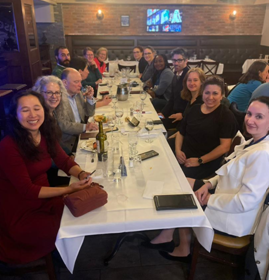
UN Water Conference Side Event:Water at the Intersection of Diplomacy and Science, organized bythe Izmir Institute of Technology, Department of International Water Resources,
At the special side event hosted at the TurkeyUN mission, hosted by ISMIR, three of the IWLA Affiliates were invited to contribute: Professor Susanne Schmeier, presented “Water diplomacy: concept and practice”
Prof. Wouters, Director of IWLA presented “International water law and water diplomacy: looking forward”., Professor Sergei Vinogradov, IWLA founding Affiliate, provided a regional case study - “Water diplomacy in a regional context: Central Asian legal and institutional frameworks.”
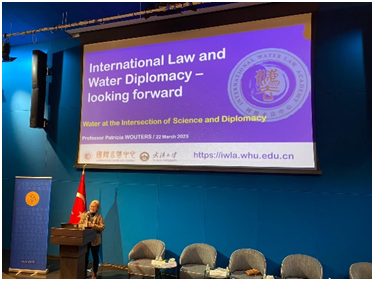
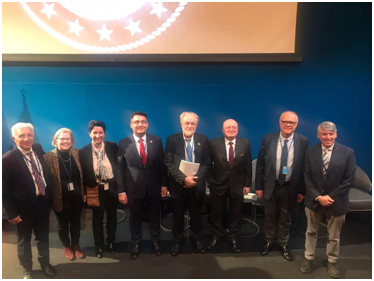

Some of the main points from the statement of this Dialogue include:
· Progress on transboundary water cooperation in accordance with SDG target 6.5 is not on track. Moreover, at a more detailed level of monitoring carried out by UNECE and UNESCO, revealed that only 24 countries have each of their transboundary basin areas covered by operational arrangements, as measured by indicator 6.5.2. There are 263 transboundary river and lake basins worldwide.
· It is necessary to strengthen legal frameworks, address data gaps, build capacity, mobilize political will, and strengthen financing. The Water Convention brings together international financial institutions, development banks, governments and basin organizations to promote sustainable funding.
· Governments should leverage existing legal instruments to achieve these aims, notably the UN’s1992 Convention on the Protection and Use of Transboundary Watercourses and International Lakes (Water Convention), serviced by UNECE.
The full statement can be found at this link.
https://sdgs.un.org/sites/default/files/2023-03/UNECE%20%28E%29%20ID4%20Rev._0.pdf.

Since 2016, the Water Convention is open for accession to all UN Member States. The Conference saw two accessions to the Convention: both Nigeria and Iraq, demonstrating tangible progress and momentum in its expansion, and building upon the recent accessions of Chad, Senegal, Ghana, Guinea-Bissau, Togo and Cameroon.However more than half of all basins worldwide still lack cooperation agreements. An editorial in Nature (March 28, 2023) mentions a study by the International Water Management Institute in Pretoria, South Africa, reaffirming that relatively few countries sharing watercourses are sharing data.Co-author Alistair Rieu-Clarke, an IWLA affiliate, emphasizes the demonstrable benefits to data sharing. In September 2021, four African countries — The Gambia, Guinea Bissau, Mauritania, and Senegal — agreed to cooperate (including by sharing data) on a giant underground aquifer, which covers more than 300,000 square kilometres and supplies water to 80% of their combined populations.” (https://www.nature.com/articles/d41586-023-00886-5)
In December 2022, a group of countries and institutions launched the Transboundary Water Cooperation Coalition, a multistakeholder partnership to advance transboundary water cooperation. The Coalition has been a strong advocate for commitments on transboundary cooperation to the Water Action Agenda.https://sdgs.un.org/partnerships/transboundary-water-cooperation-coalition
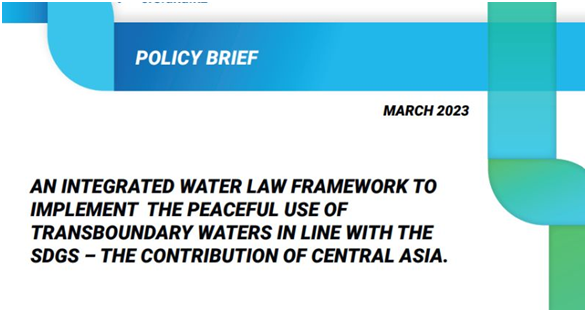
An international collaboration between IWLA Affiliates, headed up by Dr Barbara Pawletta-Januscz, with contributions from Andrew Allan, Ana-Maria Daza-Vargas, Sergei Vinogradov, Patricia Wouters and Dinara Ziganshina resulted in this Policy Brief, submitted by Central Asia with an Integrated Water Law Framework
Side event: Water-Economy-Ecology Nexus in a changing environment:
A Roadmap from New York to Beijing to Bali.
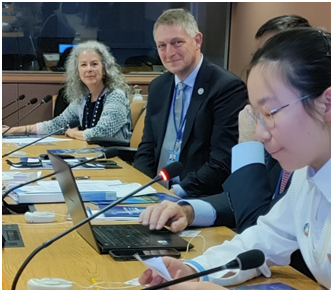

Affiliate Renée Martin-Nagle moderating side event, opened by H.E. Guoying Li, Minister of Water Resources of China, hosts to the forthcoming IWRA XVIII World Water Congress (Beijing)
“Water for All: Harmony between Humans and Nature” https://www.worldwatercongress.com/
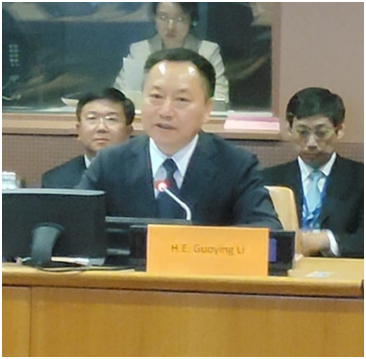

Side Event on the Role of Indigenous People in Governing Shared Waters
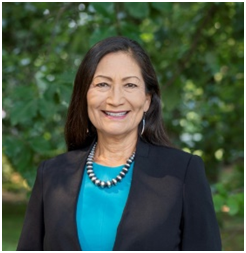
his high-level event was attended by the US Secretary of the Interior, Deb Haaland. Secretary Haaland spoke about Indigenous governance of shared waters and the importance of leveraging Indigenous led conservation and co-stewardship partnerships as we work to address the climate and drought crises.Secretary Haalandis the first Native American woman to be elected to lead a State Party and one of the first Native American women to serve in Congress, where she has focused on environmental justice and climate change amongst other issues. The event was attended by IWLA affiliate Professor Alistair Rieu-Clarke. This side event provided a platform for Indigenous people to share their experiences in governing shared waters, highlight lessons learned, and develop recommendations for future action. There was a proposal to establish apermanent committee or panel on water at the UN Permanent Forum on Indigenous Issues.
Native American women to serve in Congress, where she has focused on environmental justice and climate change amongst other issues. The event was attended by IWLA affiliate Professor Alistair Rieu-Clarke. This side event provided a platform for Indigenous people to share their experiences in governing shared waters, highlight lessons learned, and develop recommendations for future action. There was a proposal to establish apermanent committee or panel on water at the UN Permanent Forum on Indigenous Issues.
Global Water Partnership Side Event: Rewriting the Rules for Partnering: New Models for Water Action
At this eventthe MSP Sourcebook ➡https://bit.ly/3JAzau8 was launched which outlined six ingredients for effective water partnerships.
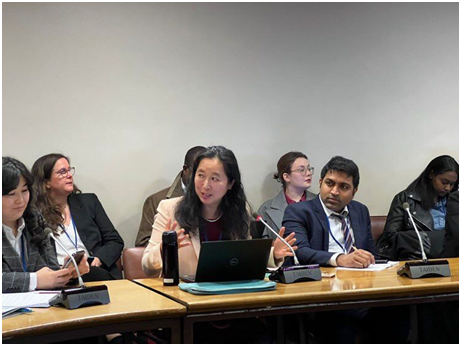
Yumiko Yasuda, IWLA Affiliate and Senior Network & Transboundary Water
Cooperation Specialist, GWP thematic lead on transboundary water cooperation
GWP Network specialist for Caribbean, Southeast Asia and Pan Asia
Side event – Dealing with Climate, Water and Peace: how participatory systems analysis supported conflict resolution at local level. Lessons from Niger.
Academy Affiliate, Susanne Schmeier participated in a side event to discuss how participatory systems analysis can help address water conflict challenges in the Sahel, with the participation of the Deutsche Gesellschaft für Internationale Zusammenarbeit (GIZ), Water, Peace & Security, Deltares and others.
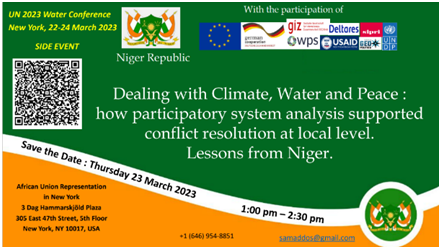
The Road Ahead – The Water Action Agenda – Water Law to enhance transboundary water cooperation
Buoyed by the inspirational contribution of so many Affiliates of the International Water Law Academy at the UN Water conference 2023, we reiterate the Academy’s commitment to the Water Action Agenda:

“I hope that the energy we experienced at this Conference will flow on to the SDG Summit in September when the world gathers together to advance the transformative actions that we need, to realize all SDGs, and secure a sustainable future for everyone, everywhere, on a healthy planet”, stated Mr. Li Junhua, the UN Under-Secretary-General for Economic and Social Affairs and Conference Secretary-General.
![]() Tel: 86-027-68756726
Tel: 86-027-68756726
![]() Address: Wuhan University China Institute of Boundary and Ocean Studies (CIBOS), P.R. China,
Address: Wuhan University China Institute of Boundary and Ocean Studies (CIBOS), P.R. China,
© International Water Law Academy. All Rights Reserved.